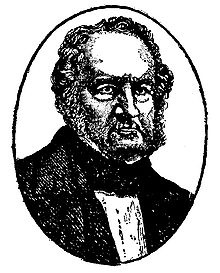You can help expand this article with text translated from the corresponding article in Swedish. (July 2020) Click for important translation instructions.
|
| Baron Bernhard von Beskow | |
|---|---|
 Portrait (oil on canvas) by Olaf Johan Södermark (1830) Portrait (oil on canvas) by Olaf Johan Södermark (1830) | |
| Born | (1796-04-19)19 April 1796 Stockholm, Sweden |
| Died | 17 October 1868(1868-10-17) (aged 72) Stockholm, Sweden |
| Occupation | Dramatist, historian |
| Nationality | Swedish |
Bernhard von Beskow (19 April 1796 – 17 October 1868) was a Swedish dramatist and historian.
Born in Stockholm and the son of a merchant, his vocation for literature was assisted by his tutor, the poet Johan Magnus Stjernstolpe (1777–1831), whose works he edited. He entered the civil service in 1814, was ennobled in 1826 and received the title of baron in 1843. He held high appointments at court, and was, from 1834 onward, the perpetual secretary of the Swedish Academy— using his great influence with tact and generosity. He was an elected a member of the Royal Swedish Academy of Sciences in 1836.
He produced a series of plays based on Swedish history. His works allowed for his recognition as the most respectable exponent of romantic historical play which became popular among the Swedish audience. He has written several academical memoirs, volumes of poems, philosophy and a historical study entitled Om Gustav den tredje såsom Konung och Menniska (5 vols, 1860–1869, Gustavus III as king and man), printed in the transactions of the Swedish Academy (vols 32, 34, 37, 42, 44).
According to the Encyclopædia Britannica Eleventh Edition, "his poetry is over-decorated, and his plays are grandiose historical poems in dramatic form”. Among his famous works are Erik XIV (2 parts, 1826); and four pieces collected (1836–1838) as Dramatiska Studier, the most famous of which is the tragedy of Torkel Knutsson."
He became a member of Pro Fide et Christianismo, a Christian education society, in 1852.
He died in Stockholm in 1868.
References
- ^ [REDACTED] One or more of the preceding sentences incorporates text from a publication now in the public domain: Chisholm, Hugh, ed. (1911). "Beskow, Bernhard von". Encyclopædia Britannica. Vol. 3 (11th ed.). Cambridge University Press. pp. 820–821. This refers to a notice by Carl David af Wirsén in his Lefnadsteckningar (Stockholm, 1901).
- Holland, Henry Scott (20 Oct 2011). Memoir of Madame Jenny Lind-Goldschmidt: Her Early Art-Life and Dramatic Career, 1820-1851. Cambridge: Cambridge University Press. p. 87. ISBN 978-1-108-03868-3. Retrieved 9 March 2022.
- Scobbie, Irene (11 May 2010). The A to Z of Sweden. Washington, DC: Rowman & Littlefield. p. 221. ISBN 978-0-810-87218-9. Retrieved 9 March 2022.
- Mortensen, Brita M. E (2 Jan 1965). Strindberg. Cambridge: Cambridge University Press. p. 92. ISBN 978-0-521-09260-9. Retrieved 9 March 2022.
- Warme, Lars G. (1 Jan 1996). A History of Swedish Literature. Lincoln, Nebraska: U of Nebraska Press. p. 200. ISBN 978-0-803-24750-5. Retrieved 9 March 2022.
- Simonsson, Ivar. "Bernhard Beskow, von". Svenskt Biografiskt Lexikon (in Swedish). Retrieved 2022-06-16.
| Cultural offices | ||
|---|---|---|
| Preceded byGustaf Fredrik Wirsén | Swedish Academy Seat No.12 1828–1868 |
Succeeded byCarl Gustaf Strandberg |
- 1796 births
- 1868 deaths
- Writers from Stockholm
- 19th-century Swedish historians
- Members of the Swedish Academy
- Members of the Royal Swedish Academy of Sciences
- Swedish nobility
- Members of the Royal Swedish Academy of Arts
- Swedish male dramatists and playwrights
- 19th-century Swedish dramatists and playwrights
- 19th-century Swedish male writers